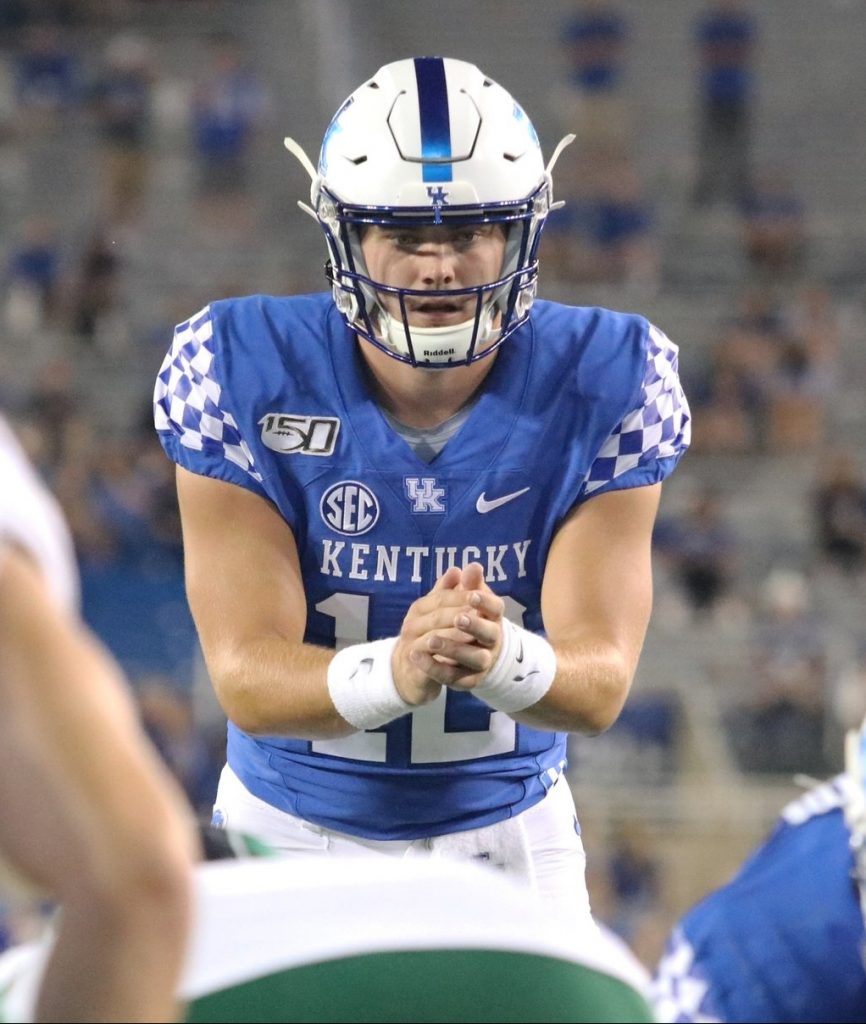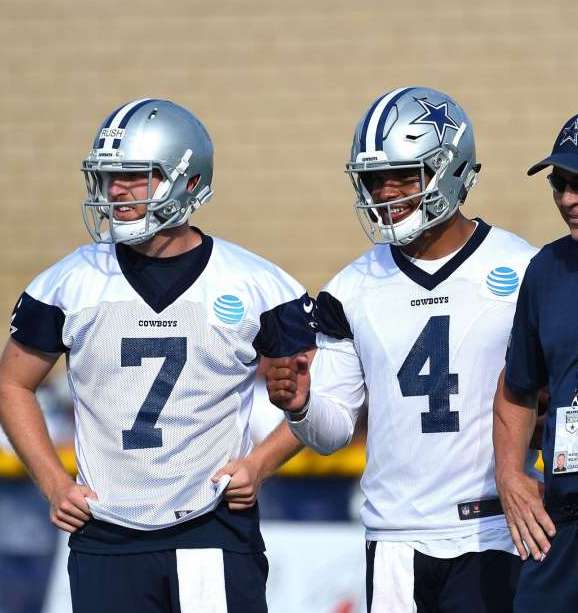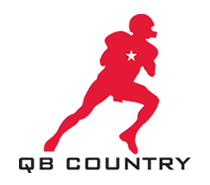
Being a QB is tough, being a back-up is tougher
By David Morris, QB Country founder
If quarterbacks have the toughest job in sports, then back-up quarterbacks may have it the hardest of them all. The pressure and physical wear and tear of being a starter is undeniable, but I think there’s an argument that the mental challenges and responsibilities are more taxing for the second-stringer.
The hardest thing about being the quarterback-in-waiting is the waiting. You’ve got to be ready for a moment that may never come. If you’re a competitor, that is incredibly difficult. And if it does come (often without any notice), you’d better be ready to play — and play well. Even if you do, there’s no guarantee you’ll get another shot when the starter comes back. Add to that a whole set of critical responsibilities that usually go unnoticed and underappreciated and it all makes for a very unique, very trying grind. The back-up quarterback better be mentally tough.
Guys who succeed in the back-up role know the deal and are equipped to handle the uncertainty. They understand that few things in football ever go according to plan. They prepare like starters and know the next snap could be their moment…or not.
“I didn’t come here to be a frat star”
If there’s one trait you have to have as a back-up — it’s confidence. Think about it. Nobody thinks you’re the man. You’re “not as good” as the starter. All you’ve got is your own belief and knowledge of what you can do. You must remember and believe that you’re a good player just waiting for your time. Most the time there is no one there to remind you.
Jake Fromm started his Georgia career as the second-stringer to a very good player in Jacob Eason. An injury led to an opportunity that Jake would never relinquish. This season Fromm has led the Dogs to a strong start and turned things over to his back-up Stetson Bennett in the second half of the last two games. Stetson has gone 19/24 for 234 yards and two TDs and had perhaps the QB quote of the season so far:
“I’m completely confident in myself. That’s why I walked on here in the first place. I didn’t come here to be a frat star and be on the football team. I came here to play ball.”
No one is ever going to question whether Jake Fromm should be Georgia’s starter. He may be the best QB in college football. But no one is ever going to question Stetson’s confidence, either. (For the record, we’re fortunate to train both of these guys.)
Tireless, unflinching optimism
Along with confidence, comes optimism. I think about the winding road that Gardner Minshew has taken to become an NFL quarterback. Gardner had no FBS offers out of high school. He walked on at Troy and sat the bench. He played junior college ball. He started just seven games at East Carolina. He transferred to Washington State, where he finally became a full-time starter and led the Cougars to the best season in school history and was named Pac-12 Player of the Year.
Two weeks ago, Gardner became the first rookie quarterback in the 2019 draft class to take a snap under center after Nick Foles got hurt early in game one. He completed his first 13 passes (the longest completion streak by a player to start their career in the last 40 years) and finished 22 of 25 for 275 yards and two touchdowns.
None of this happens without tireless, unflinching optimism. Only an optimist fights this long and wills his dream to come true. And only a confident optimist could pull off this look:
The Texans are 7 1/2 point favorites over the Jaguars but I saw Gardner Minshew get off the team plane and I’ve got Jacksonville by 35. pic.twitter.com/OqRHUK3gBW
— Super 70s Sports (@Super70sSports) September 15, 2019
It’s humbling
Another essential trait for the back-up is humility. You have to swallow the pill that the game plan is not about you. At the same time, while it’s not about you on the field, you have an incredibly important job to do. You have to stay ready and help the starter be ready. The starter knows he will play. The backup may or may not play.
Two weeks ago, Kentucky quarterback and QBC Mobile trainee Sawyer Smith took over for injured starter Terry Wilson and threw two touchdowns in the Wildcats’ win against Eastern Michigan. A week later, he nearly led the Wildcats to an upset of #9 Florida. Last year, Sawyer was at Troy and replaced injured starter Kaleb Barker (a QBC Birmingham trainee) at midseason and helped lead the Trojans to a ten-win season and bowl victory. He fully embraced the role of being a back-up, and emphasized in recent post-game comments that it’s not about personal gain, but about the team:

Sawyer Smith (Kentucky)
“I came here to fill the need as a back-up quarterback. That’s what I signed up for. I would have been fine being here two years from now talking to you guys and walking across [the stage] with a master’s in my hand. But this happened. Now I want to take this team as far as we can go. You want to win every Saturday and that’s what I’m going to do.”
Staying ready
As a back-up, you also have to have incredible focus. It’s easy to focus on something when you’re in it, when it’s happening to you. It’s a lot harder to focus when it’s within your grasp, but you don’t have it. That can be really hard to manage, especially the longer the season goes. You have to find the strength to lock in and pay close attention to detail — to prepare like a starter — even though you haven’t touched the field for months and the odds are you’re not going to play. If you can stay ready in that uncertain environment, you may not be “the man,” but you are a man.
I know this well. I was a career second-stringer at Ole Miss playing behind Eli Manning, a guy who was never going to come off the field. Towards the end of my career after literally being a play away for four years, the temptation was to say, “To hell with it. This guy isn’t ever coming off the field, it’s just not going to happen, so why kill myself getting ready every week?” I’m the most optimistic guy in the world, but preparing, waiting and never starting takes a toll on your belief system. The point is, this is hard stuff and it requires a lot of focus and maturity. I never completely mastered it, mentally. But I learned so much through this experience.
Slightly on the outside
I think there’s a level of emotional intelligence and empathy that’s just different when it comes to being a backup. One of our QBs, who’s a back-up at a very good college program and navigating the challenges of being a few rungs down on the depth chart, recently sent a text that I think sums it up well:
“QB is really unforgiving when it comes to playing time. You’re hoping for your chance, but for that to happen someone either has to get hurt or mess up repeatedly. But they are also your closest friends and them messing up means the team is hurting. And you’re also trying to help them and be a good teammate. It’s a tricky situation.”
All of this can have you feeling slightly on the outside. Even if you get a ton of reps (which happens in practice at the high school and college levels, much less so in the NFL once the season gets rolling), it’s very easy to feel that you don’t matter all that much, that you don’t really belong.
But you do. And you matter in a big way. If anyone has ever wondered about the importance of the back-up QB, the start of this NFL season should make it obvious. Big name starters like Luck, Brees, Darnold, Rothlisberger and Foles are gone. Seasons are on the line with back-ups under center. It’s sink or swim.
How you’ve prepared for your moment will be the proof. The sooner you realize it, the better chance you’ll have to succeed.
Here are a few tips for success as a back-up:
Prepare like you’re the starting quarterback. It should go without saying, but there are no “back-up” reps in practice. Do your best to execute every play with the same intensity you’d bring to an actual game. Know the playbook better than anyone else on the team.
Lead and love the process. Back-up quarterbacks should enjoy and bring energy to practice. They go hard in the offseason. They love the weight room. They love being part of a team and build team relationships. They have a growth mindset and are constantly finding ways to learn and improve. They never stop setting goals. Back-up or starter, all the above applies to you.
Stay locked in on game day. As a back-up, you can’t allow your mind to wander. It’s like being an air traffic controller. You’re not flying the plane, but you’re in the tower and you can’t take a second off if you want to make sure that plane lands safely. Lock into the game plan; on every play, look at the defense and get pre-snap reads as if you’re the guy out there pulling the trigger. Take mental reps and think through progressions. This guarantees you are more prepared and also allows you to deliver tips to the starter. If you can’t execute in your mind, it’ll be nearly impossible to execute when live bullets are flying.

Cooper Rush and Dak Prescott.
Ask to be on the head set. In the NFL, the back-up quarterback is like another coach and often becomes a coach when his playing days are over. He works with the offensive coordinator to study opponent film and break down defenses and contributes to the preparation of the starter. Guys who do this well, who are students of the game, last for a long time. One of our trainees, Cooper Rush of the Cowboys, is a hell of a back-up because he’s a hell of a quarterback. He has a brilliant mind and he’s also a guy you can count on and trust. If you asked Dak Prescott, he’d tell you that Cooper has made him a better quarterback. Interestingly, the Cowboys’ talented OC Kellen Moore is a longtime Cowboys back-up who Cooper replaced in the current back-up role. Cooper will tell you Kellen is the smartest guy he’s ever been around. Dallas head coach Jason Garrett is another longtime NFL back-up. Being on the head set helps you understand what the coaches are seeing, how they think and communicate.
Success in any workplace
Can you contribute to the QB room and be an asset to the starter? If the answer is yes, you are someone the team and staff can count on if your number is called.
And if you can be a trusted back-up quarterback, chances are you’ll have what it takes to succeed in any workplace. I think back-up quarterbacks make great employees because they’re good teammates, they communicate well and are versatile. Back-up quarterbacks know how to wear many hats, and they typically have less ego because being a back-up is humbling. For these same reasons, the back-up quarterback will always have something to prove. Back-ups are hungry and don’t need much outside motivation. The motivation is within.
Own it
I used to be embarrassed to say I was a career second-stringer. Now I own it because I love what it taught me. Being a back-up is my college football story. That kinda sucks, but I know the truth…
…I would have lit it up!
If you are a back-up quarterback right now, don’t be frustrated. Be ready! That’s your job.


